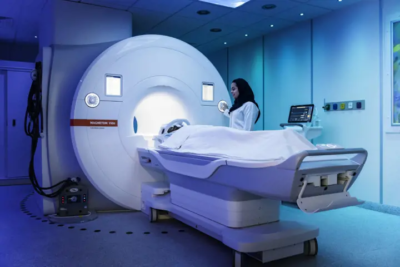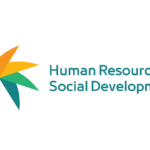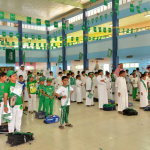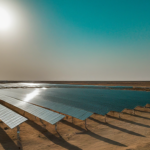
“The name Aber was selected because, as the Arabic word, for “crossing boundaries”, it both captures the cross-border nature of the project as well as our hope that it would also cross boundaries in terms of the use of the technology.”
-Saudi and UAE Central Banks issued a report at the one-year mark of Project Aber, a joint effort to establish ‘proof of concept’ for implementation of a central bank digital currency (CBDC) based on blockchain technology. The report concluded that a dual-issued CBDC was “not only technically viable” for cross border payments, but that CBDCs present “significant improvement over centralized payment systems in terms of architectural resilience.” [Cointelegraph]

“Think of the difference in versatility between dumb phones and smartphones. For the past two decades we have been consumed by preventing Iran’s big weapon, but it is the thousands of small smart weapons Iran has been proliferating that have become the real and immediate threat to its neighbors.’’
-Karim Sadjadpour, a senior fellow at the Carnegie Endowment, quoted in Thomas L. Friedman’s opinion article in the New York Times assessing how the Middle East threat environment has changed since Joe Biden served as Vice President. [New York Times]

“Boeing projects a 20-year opportunity for Middle East commercial services valued at $725 billion, including requirements for supply chain and maintenance, repair and overhaul capability focused on newer airplane technologies and software solutions to reduce operating costs and improve efficiency.”
-Boeing’s 2020 Commercial Market Outlook, which foresees 4.3% annual passenger growth over the next 20 years in the Middle East with the region’s commercial fleet expected to reach 3,500 by 2039 – more than doubling the current 1,510 airplanes. [Hotelier Middle East]

“Prior to this, I think very few of us would have thought of importing shrimps from Saudi Arabia. It is not something that comes to mind. But now that we know this can be done, and it can be done in a very price-competitive manner, then we can explore with the Saudi embassy and suppliers on what other products they can offer.”
–Chan Chun Sing, Singapore Minister for Trade and Industry, discussing the first shipment of Saudi shrimp sourced from the Red Sea. The Red Sea shrimps are priced at a premium as they are known for their rich flavor, thanks to the Red Sea’s high salinity compared with seawater in other parts of the world. [Straits Times]

“Maintaining the riyal peg at current levels remains a key policy priority for the Saudi authorities. In a low oil price environment, however, this means that fiscal policy will have to tighten, keeping the budget deficit in check in order to ensure that external balances remain consistent with peg stability.”
-Farouk Soussa, London-based analyst at Goldman Sachs, said in a report discussing the Riyal peg to the dollar, in a note to clients. [Bloomberg]

“When the world needed leadership [to combat Covid-19] there was none.” The G20 stepped up because some nations “turned inwards towards nationalism.”
-Khalid Al-Falih, Saudi Minister of Investment, reinforcing the G20’s stated aim is to pull countries together to combat Covid-19, accelerate testing, treatment and vaccines for all, while helping poor nations cope with the pandemic’s economic impact. [CNN]

“We have a genuine bilateral programme with a joint aspiration to reduce emissions. If we can help each other bilaterally in attending to that, it will be a good launching pad for a good relationship with the yet-to-come Biden administration.”
-Saudi Energy Minister Prince Abdulaziz bin Salman, speaking at a G20 event, expressed confidence that there will be many opportunities for U.S.-Saudi cooperation across a broad range of common interests. [Arabian Business]

“We have done a study with the ITU that shows four months’ worth of lockdown is going to cost the global economy close to $10 trillion in the next 10 years. This is why in the Saudi G20 presidency, we drove consensus to make sure that connecting the unconnected world and connecting humanity is a top priority.”
-Abdullah A. Alswaha, Saudi Minister of Communications and Information Technology, during an interview with CGTN adding that “digitalization is the biggest social equalizer and economic multiplier” in a world still reeling under the shadow of COVID-19. [CGTN Digital]

“It is estimated that over 75 percent of all emerging infectious diseases in humans are zoonotic, that is they’re transferred from animals to humans, which itself is directly related to human activities, like deforestation and the destruction of wetlands. So, let us seize this historic opportunity to hit the reset button. To integrate into this brave new world a greater respect for our environment, for biodiversity and for planet.”
-John Pagano, CEO, Saudi Red Sea Development Company (RSDC), during a G20 media briefing outlined RSDC’s intent to accelerate the world’s transition to sustainable development. [Arab News]

“This fall, new international students enrolled at U.S. universities online or in person fell by 43%, according to a survey of more than 700 schools released Monday. That’s the largest decrease recorded by the Institute of International Education, which has been publishing data on international enrollment since 1954.”
-John Seewer and Collin Binkley reporting for AP on the steep drop in numbers of international students attending U.S. universities this year. [Associated Press]











